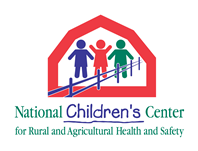The National Children's Center for Rural and Agricultural Health and Safety will host two workshops soon on preventing injuries of children on farms and ranches. Coverage by the news media is welcome.
The first workshop will be in Lexington, Ky., Aug. 6-7, and the second will be in Hershey, Pa., Sept. 17-18.
The workshop website says, "Learn how you can help safeguard children and youth who live, work and play on farms and ranches. This information can be used to develop and enhance childhood agricultural safety strategies for your organization. Interactive sessions will be facilitated by safety experts and leaders in the field of childhood agricultural injury prevention."
Registration is limited to 60 participants. Registration is $249, but only $199 for early birds. Click here for more information or to register.
Joan Mazur of the University of Kentucky, who is helping with the Lexington workshop, attended an earlier one in Iowa, and The Rural Blog asked her to write about it and her work. Here's her report:
By Joan Mazur
I have been at the University of Kentucky College of Education since 1993 and have been associated with the Southeast Center for Agricultural Health & Injury Prevention with continual federal funding since 1994. The interdisciplinary nature of this center, housed at the UK College of Public Health, as well as its focus on solving real-world issues on family farms, has supported my research interests at the intersection of public education and public health. My husband and I also own a 70-acre farm in Washington County, Kentucky, so my interests in farm safety and health are also personal.
The first workshop will be in Lexington, Ky., Aug. 6-7, and the second will be in Hershey, Pa., Sept. 17-18.
The workshop website says, "Learn how you can help safeguard children and youth who live, work and play on farms and ranches. This information can be used to develop and enhance childhood agricultural safety strategies for your organization. Interactive sessions will be facilitated by safety experts and leaders in the field of childhood agricultural injury prevention."
Registration is limited to 60 participants. Registration is $249, but only $199 for early birds. Click here for more information or to register.
Joan Mazur of the University of Kentucky, who is helping with the Lexington workshop, attended an earlier one in Iowa, and The Rural Blog asked her to write about it and her work. Here's her report:
By Joan Mazur
I have been at the University of Kentucky College of Education since 1993 and have been associated with the Southeast Center for Agricultural Health & Injury Prevention with continual federal funding since 1994. The interdisciplinary nature of this center, housed at the UK College of Public Health, as well as its focus on solving real-world issues on family farms, has supported my research interests at the intersection of public education and public health. My husband and I also own a 70-acre farm in Washington County, Kentucky, so my interests in farm safety and health are also personal.
Over the years I have developed with colleagues many educational programs, most of which involve technology and are targeted at a high at-risk group of teenagers from 14 to 19. Narrative simulations, digital games and other online interventions for preventing injuries and fatalities have been used at schools in farming and rural communities in the Southeast.
While many of our more horrifying statistics on youth injury and fatality and injury in agriculture are decreasing, one segment of the at-risk younger population has resisted efforts. Every day on farms in the U.S., three children die and 33 are injured. These injuries and fatalities are preventable, and there are guidelines and best practices to assure that children can take advantage of the many benefits of living or working on family farms in safe and healthy ways.
Recently I attended a Childhood Agricultural Injury Prevention (CAIP) Workshop in Iowa hosted by the National Children’s Center for Agricultural Safety & Health, whose national mission is to prevent agricultural injuries and fatalities to children. Many of us in all fields over the years have attended workshops, even entire conferences that disappointed despite a promise of improved professional learning. However the CAIP Workshop was excellent!
Recently I attended a Childhood Agricultural Injury Prevention (CAIP) Workshop in Iowa hosted by the National Children’s Center for Agricultural Safety & Health, whose national mission is to prevent agricultural injuries and fatalities to children. Many of us in all fields over the years have attended workshops, even entire conferences that disappointed despite a promise of improved professional learning. However the CAIP Workshop was excellent!
Every session was highly informative -- delivered to the entire group, with many interactive small-group components to practice and absorb the various techniques and approaches to engaging stakeholders in preventing injuries to children, whether working or non-working, on farms or even in specialized settings such as agritourism sites (orchards, farms, petting zoos etc).
We have now scheduled a CAIP for Lexington Aug. 5-7. I hope some of you can consider going, as journalists, teachers, counselors and other educators or others such as insurance personnel, FFA, bankers or other community member in positions to influence individual families and policy makers in decision making that can promote the economic, social, educational and personal mental and physical health of rural farm families and children.
This KY-CAIP workshop is also a partnership between the National Childrens Center for Ag Safety & Health, the North Carolina Agromedicine Institute and the Florida Coastal Center for Agricultural Safety & Health, which will be providing expertise for regional agricultural safety and health issues.
This KY-CAIP workshop is also a partnership between the National Childrens Center for Ag Safety & Health, the North Carolina Agromedicine Institute and the Florida Coastal Center for Agricultural Safety & Health, which will be providing expertise for regional agricultural safety and health issues.

No comments:
Post a Comment